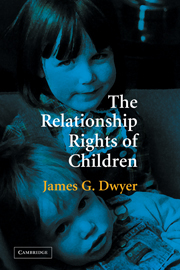Book contents
- Frontmatter
- Contents
- Acknowledgments
- THE RELATIONSHIP RIGHTS OF CHILDREN
- Introduction
- 1 Why Rights for Children?
- 2 The Existing Relationship Rights of Children
- 3 Paradigmatic Relationship Rights
- 4 Why Adults Have the Relationship Rights They Do
- 5 Extending the Theoretical Underpinnings of Relationship Rights to Children
- 6 Rebutting Defenses of the Status Quo
- 7 Implementing Children's Moral Rights in Law
- 8 Applications
- Appendix: The Conceptual Possibility of Children Having Rights
- Notes
- Index
5 - Extending the Theoretical Underpinnings of Relationship Rights to Children
Published online by Cambridge University Press: 23 July 2009
- Frontmatter
- Contents
- Acknowledgments
- THE RELATIONSHIP RIGHTS OF CHILDREN
- Introduction
- 1 Why Rights for Children?
- 2 The Existing Relationship Rights of Children
- 3 Paradigmatic Relationship Rights
- 4 Why Adults Have the Relationship Rights They Do
- 5 Extending the Theoretical Underpinnings of Relationship Rights to Children
- 6 Rebutting Defenses of the Status Quo
- 7 Implementing Children's Moral Rights in Law
- 8 Applications
- Appendix: The Conceptual Possibility of Children Having Rights
- Notes
- Index
Summary
On the whole, the history of liberalism reflects a tendency to expand both the definition of the public sphere and the requirements of equal treatment. … [T]hese recent developments … reflect something fundamental about the inner logic of liberalism.
Can the justifications for adult relationship rights elaborated in Chapter 4 be extended to the case of children's relationships, such that something approaching equal treatment of children might be warranted? Political theory to date, in addition to devoting little attention to intimate associations in general, has been almost entirely silent about family formation and dissolution for children in particular. From the outset, political philosophers have focused principally, if not exclusively, on issues of pressing concern to adults in the public sphere outside the home. On the occasions when political philosophers have made mention of children, it has typically been with reference to children's formal education, because that was the one aspect of children's lives they deemed relevant to the public sphere and of interest to the state. Education was the means by which children became future citizens, so both private individuals and the state had interests at stake. And discussion of education has principally been adult centered, focused on the desires of parents to control their children's upbringing and state interests in producing a certain kind of citizen.
There has been more discussion of child rearing among political theorists in recent decades than ever before, but it has remained largely confined to schooling, and the perspectives most prevalent are still adult-centered ones, focused either on the rights of parents or on statist aims such as producing tolerant future citizens.
- Type
- Chapter
- Information
- The Relationship Rights of Children , pp. 123 - 169Publisher: Cambridge University PressPrint publication year: 2006



